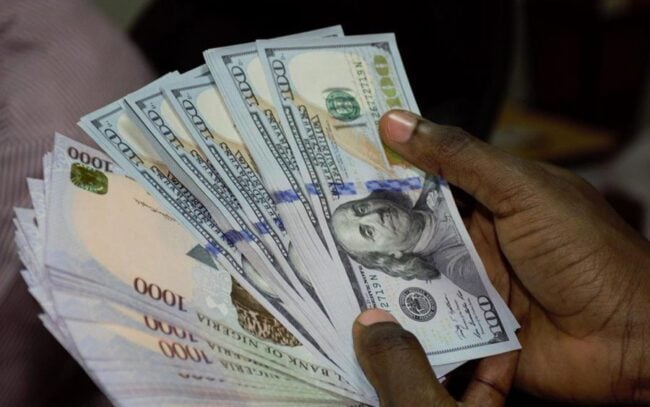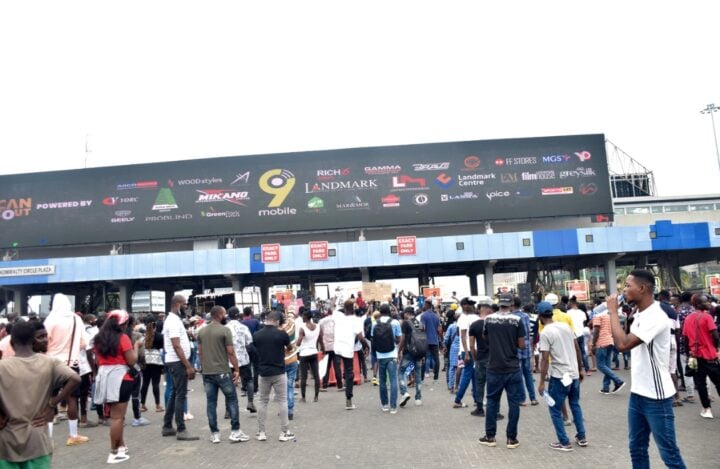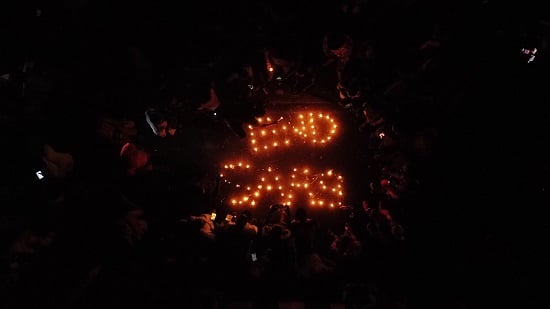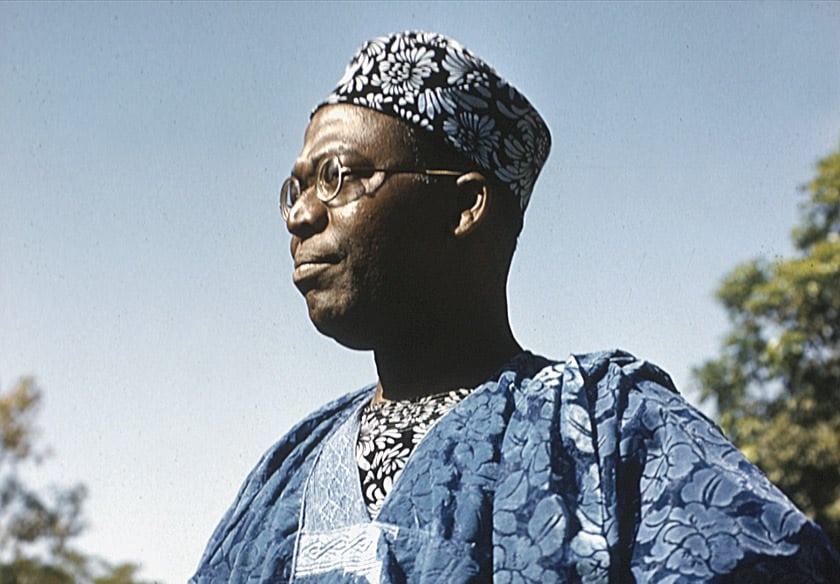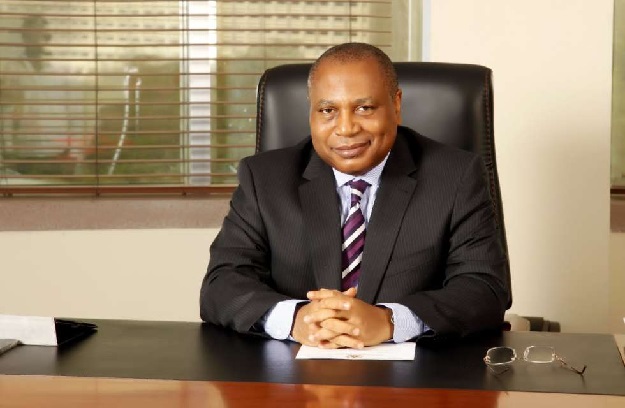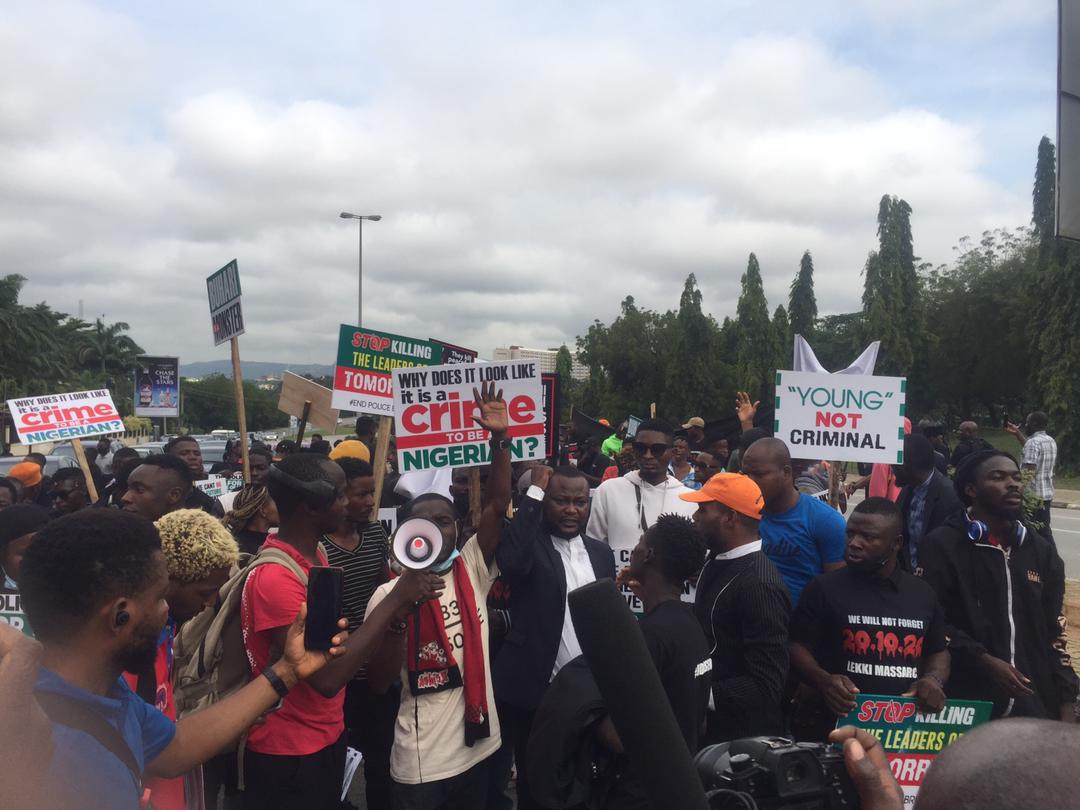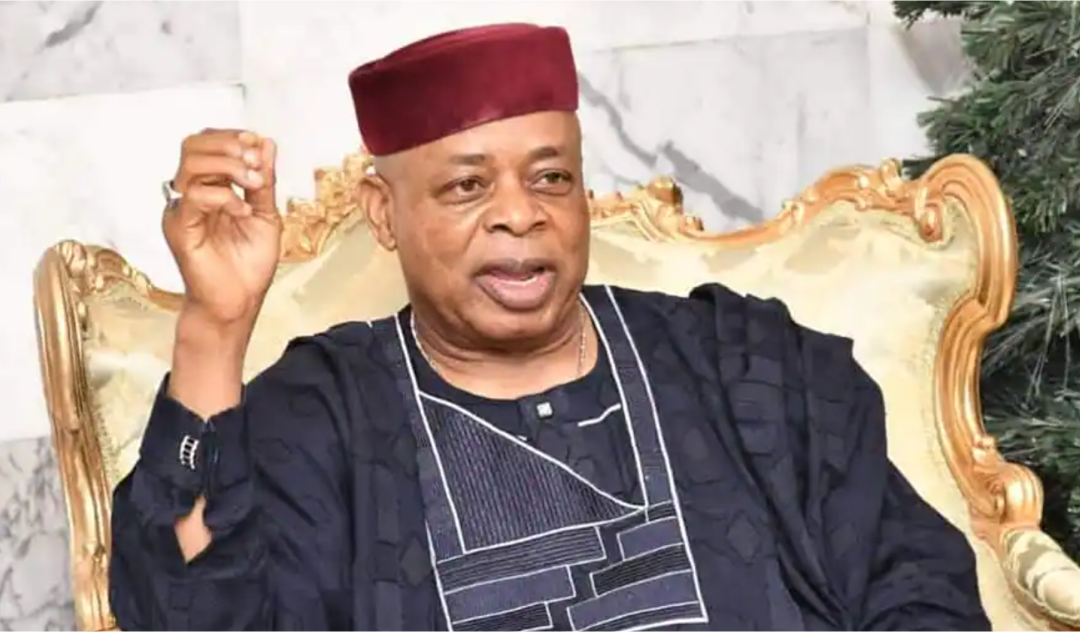I reviewed a 10-years graph of the interaction between naira and USD and found that in the years under President Jonathan when we complained to high heavens, naira stabilised at around N150 to the dollar for four solid years until it encountered some volatility as Nigeria prepared for the 2015 elections, thereby closing around N199. I checked on another graph with a longer tenure (1957 – 2021) and saw how since President Babangida started devaluing in 1986, there has been a endless fall, from N3 to the US dollar, to around N12 in 1993 and then to about N22. The N22 regime for official exchange rate was maintained until 1999 when naira was devalued sharply to about N90 and then we saw a steady fall to about N140. Under President Umaru Yar’Adua in 2007/2008, the naira firmed up for the first time ever since the devaluation game started, to N120 but we lost track in 2009/10 and devalued to around N149. It was this intricate balance that the Jonathan government maintained until 2014.
Since the Buhari government came in, and in spite of his consistent swearing never to devalue the currency, it turns out that this is a major policy – most prominent plank – of the administration. In order words, devaluation is something this administration knows how to do, if nothing else. The naira has seen serious volatility like never before, crashing from N199 to N306 in 2016, N360 in 2017, N390 in 2020, and N414 in 2021. Since the statement of the vice-president to the extent that the naira is yet to find its value and that is the reason why investors are not coming, official rates have further crashed to N422, with every sense that a lot more is coming. This is a review of official markets, where government people get their fill of foreign exchange at the expense of taxpayers. The ‘black market’, which is mostly accessible to ordinary folks, has of course gone haywire, crashing from around N220 in 2015, to N580 today.
I note that in May 2016, as Buhari kept grunting about not taking IMF advice on devaluing the naira, Osinbajo moved against that position and stated that the CBN had to change its policies, thus giving a clue of imminent devaluation, or rather, sealing the fate of the naira as at then. See HERE. I took note back then that the man may either have some ultra-right economists in his team or is fully sold on IMF/World Bank narratives, some of which they had walked back in the past. But like Professor Quiggin of Queensland University, Australia said, some dead economic ideas still prowl, especially in benighted countries like Nigeria, wreaking havoc. They are dead ideas, but are still alive. Welcome to Zombie Economics.
Fast-forward to the cryptocurrency controversy, when the CBN had to remind banks of a 2017 memo in which they were cautioned about speculating on that pseudo asset, or offering their platforms to traders and exchanges, Osinbajo stepped up powerfully to berate the Central Bank (again), when he said that cryptocurrencies should be regulated rather than banned. On that occasion, he had very stern words for CBN, that could have damaged the morale of those working there. They were put out as being incompetent and unpatriotic. The crypto market was almost at peak (February 26, 2021) but would later reach a nadir in April before entering a cataclysmic decline in May, from which it is yet to fully recover. Let us take a pause and consider how crypto markets have been so volatile. We learnt that Nigeria was the country with the second highest trading volumes in the world – in spite of our low per capita income. It could only mean that corrupt folks were using cryptos to disguise their loot, and cryptocurrencies were enabling a lot of criminal activities for which a section of our young people are popular. That instrument is certainly not one that a sovereign would jump into at the deep end. Thankfully, the Central Bank of Nigeria did not buckle under the staccato from the VP or turn over our financial system to be sacrificed on the altar of cryptocurrencies. Perhaps we would have been in a different kind of trouble today.
Advertisement
The point here is that whatever policy or ideology anyone subscribes to, it is important to stand back and survey the damage – or the achievements, if any, from time to time. With this one-way devaluation we have embarked upon since 1986, which is now on steroids under this very government, I cannot see any achievements that devaluation has brought upon us, only pains. It is not enough to subscribe to these policies, just to look like you are intelligent to the IMF or World Bank, who themselves have apologized in the past for some of these self-same policies. Whereas the IMF/World Bank almost considers it a policy plank for countries like Nigeria to devalue currencies especially when we want to borrow from them, as they say devaluation enables our export volumes and receipts grow, thereby helping us shrink trade deficits and become more self-sustaining, they know that in reality, the opposite is the case. The same bodies thus advise that devaluation will not solve economic problems, when addressing serious nations with good exports to push, like China. See a 2019 statement from IMF to this effect.
Fundamental damage has been done to this economy and polity by this government, in the last 7 odd years. We have never been more divided because we are stuck with a taciturn leader whom someone said is not even interested in reconciling members of his own family, much less uniting the whole of Nigeria. Separatist groups have taken on a life of their own, while criminals have driven law-abiding citizens to the fringes. Kidnapping for ransom is the new game that pays, and nowhere in the country is safe. We still argue about open grazing of cows while marauders from west and north Africa make incursions into our northern villages and even down south, killing and maiming and the president is hardwired to defend his Fulani kin from wherever they may come. Businesses have collapsed, and unemployment rate is at an all-time high, and in all this, our Vice President has called for even more devaluation, with the naira further tumbling and life getting tougher for the masses. Meanwhile, the same story has been used over and over again, since 1986 when we commenced this journey of naira devaluation. Indeed when rich men who have already converted their loot into US dollars call for devaluation, what they are really saying is that those who depend on the naira to survive, and have no holdings of US dollars, should suffer more. We should also note that the poor folks in Nigeria are taking their own revenge against this chicanery from their leaders. A lot of the crime takes place when the poor try to strike back at a society that takes them for granted. For it is itself a crime, having converted your wealth to foreign currency, to openly call for devaluation. It is simply insider trading.
I wish to point direct attention to the following issues with regard to this foreign exchange matter. I am sad that a mere nonentity like me labors daily to teach, to educate, to try and save our country from painful cataclysm, while people we are paying to do just that, work at cross purposes:
Advertisement
- Professor Ricardo Hausmann and colleagues at Harvard developed the concept of economic complexity. The truth is that what holds nations down are not sophisticated issues like their exchange rates, but the intrinsic and extrinsic value of what they produce. If there was ever one policy that could assist Nigeria, it is this idea of economic complexity. We should add value to what we produce and be less dependent on everything from other nations. Economic complexity defines the knowledge content or quotient of goods and services produced in a country. Unfortunately, under Buhari, Nigeria has dropped to the last nation out of 133 surveyed on the Economic Complexity Index (ECI). We are 133rd in 133 countries and only ever went to the 132nd position in 2012. This is what Osinbajo should worry about. The report says that Nigeria’s economy is the MOST PRIMITIVE in the world, behind countries like Guinea, Ghana, Papua New Guinea, and what have you. This is the real touchpoint. Matched with the fact that we have very sophisticated tastes, this is where we ruin ourselves. It is a disservice to look at this as a foreign exchange issue.
- We have seen enough of absurdities already in this country and it takes considerable effort not to sound personal on these issues with our leaders. All of them, bar none, spend dollars. They have, therefore, for one reason or the other, displayed a lack of confidence in the naira. Everything falls to pieces once this vote of no confidence is cast by the same people with whom we have entrusted the nation. You will never see British leaders holding dollar in Britain, or Euro? You will never catch any European leader holding pounds, or dollars. But Nigerian leaders – from the president to his vice, to National Assembly members, to governors and even councilors, take pride in spending dollars like it is an achievement. I challenge them to disprove me. They load dollars around in their car booths. I urged the CBN to diversify the issuance of PTA away from the US dollar as a way of breaking that market and even encouraging a closure of the gap between official and parallel fx markets. They have not done anything like that. However, our politicians and their children spend dollars and some never touch the naira. The VP can look into this.
- The Nigerian government needs to reorder priorities. I wonder whether we can save ourselves at this stage. In the 2022 budget, the president has increased his international travel budget to N1.5 billion. The National Assembly is digging in to collect their own. Among the circle of the privilege, it’s as if the country is blooming in every regard. All politicians are maxing out and leaning on the system with all their weight. Nobody can caution anybody. Nigeria will still spend on estacodes, and pilgrimages, presidential fleet, medical tourism for the big men, and buy exotic cars from abroad for them. The fact that corruption still thrives, will put pressure on the naira as corruption payments are made in cash, preferably in US dollars. Is there anything that can be seriously done about corruption? Or have we lost the war? If the VP can help tangibly in this area, that will be great. The focus on naira rates is too narrow.
- I have humbly put out the little I know out there. But painfully, these ideas have been deliberately ignored. On the matter of foreign exchange, I repeat that we need to consider the Marshall-Lerner conditions that say devaluation will not help a country without exports that are price elastic. Nigeria almost has no exports apart from crude oil, which is priced in US dollar already. Now, whereas the naira cannot hope to compete with global currencies, the only option we have is to tightly manage the currency and there is nothing wrong at all, in the demand management strategies of the CBN. No one should expect that we open the tap and allow anyone to make away with any amount of dollars at the expense of our lean reserves in the name of buying whatever they want from abroad. No way. And apart from the Marshall-Lerner conditions, I have also tried to educate folks about the Three Generations of Currency Crisis, and a lot of the lessons around that is that we should mind our statements around the currency. The world is watching our lips. If, despite astute, prudent and pragmatic management, the naira loses value, all well and good, but we must never use our statements to encourage further free fall. Even our ancestors knew this when they said it is what you call your thing that the world will call it. If we say “The naira is overvalued, is unrealistic, should be worth a lot less than it is worth” etc, the smart boys in financial markets will move in and have the naira for lunch. The VP’s statement is therefore most unfortunate.
- The VP also mentioned that Nigeria is not getting dollars in anymore and that this is because investors know that the naira is overvalued. This is also another unfair and unbalanced statement, which panders to right-wing narratives. It is majorly because of insecurity that we are not getting dollars. When I visited East Africa in 2013/14, I saw many foreigners on their streets. Tourism thrives. Ghana is also a peaceful nation, and the world is there, spending. Even Nigerians take millions of dollars into the Ghanaian economy through purchase of properties and tourism. The VP’s statement discounts the fact that we need to make this country safe and try to recover some of our lost dignity as a people. This country is at war, and as Farooq Kperogi once wrote, only 3 types of investors will come here; the criminally minded, the absolutely ignorant, and the ones who enjoy sadomasochism – the financial kind. The statement also painfully plays into a sad Nigerian reality – that having given up on just organizing this country to be normal and livable, all our successive governments have been doing is looking for hot money (Foreign Portfolio Investors), to help paper over the issues – and also to earn commission from – while those guys further make mincemeat of our economy. Indeed, insecurity is currently priced into our naira. I mean that if we were a secure, patriotic nation, who were united and moving on in peace and love, the naira will be a lot firmer even if we were forced to devalue. There is therefore a negative perception premium built into the value of the naira today – official and parallel rates.
- Misstatements around the naira also have knock-on effects. Apart from the obvious one which is an immediate fall in the value of the naira, inflation also spikes. Sellers of food in the market, and transporters, are listening to the news and so when government officials promise that more devaluation is coming, they jump right ahead and start to increase prices. I wish people like the CBN governor, VP, minister of finance and other top officials will understand that all their interventions should be behind closed doors. Nigerians are converting more of the little they have into dollars and wait for the naira to crash some more as promised by the VP. This means less money available for lending, higher inflation and companies that have barely hung on to dear life finally throw in the towel and send their employees packing. Is this what we want?
- Finally, the VP excoriated the CBN on its interventions in the fiscal space. It is easy to do that now, but the CBN cannot sit on its hand and not deploy extra-monetary policies when a nation is in dire straits. Since the necessary painful fiscal adjustments have not been made and may never be made because the main beneficiaries are also the people who can make the change, then the monetary authorities will not only do their jobs but move into overdrive. This is something that has been noticed everywhere in then world. The COVID-19 crisis is a good case in point. Monetary – not fiscal – authorities have had to conjure cash out of thin air to distribute to people just to survive. Yes, monetary authorities can communicate better with fiscal ones, but in the heat of the moment, everyone who can work must keep working. “No time to check time”, as our people say on the streets. In spite of the many flaws of the CBN, if that institution was less dynamic and hadn’t moved when it did, well perhaps we could have called it curtains on project Nigeria by now. But the CBN must expect to be blamed, while it tightens its processes in every way.
ZOMBIE ECONOMIC IDEAS
Let me just run through a few of them quickly, and please note, dear readers, that these ideas still prowl all over Nigeria even though they are long since dead. Our economic policymakers strongly believe in them, and this is because they mostly do not develop themselves in the field or are too doctrinaire and dogmatic to interrogate their thoughts and belief around economics, which – like science and technology – keeps evolving very very rapidly and is not what it used to be 20 years ago. Also, we all know that in our academia, they are stuck with very old texts, which they regurgitate to poor students, year in, year out. Academic circles are almost impossible to barge into and change because a lot of their ideas are dated and they don’t want any disruptors to upset the apple cart. So, we have a huge problem on our hands.
The first zombie idea is the concept of some ‘invisible hand’ which comes and allocates resources. It is ‘invisible’, chiefly because it doesn’t exist. The ideas of Adam Smith have been challenged even though we still revere him in the circle of Economists. But economists have found out that only clumsy governments wait for an invisible hand to properly allocate resources. You have to watch and apply science. Trickle-down economics is another zombie idea. In reality, and in recent times, economists have realized that oftentimes, wealth trickles up and not down. Or wealth created at the top simply remains there more and more because human beings have fashioned out larger receptacles at the top. This is more so as many rich people now don’t need as many staff as before, and technology has led to the robotization of many factories – even to achieve better efficiency. What is more? For the very rich, their tastes are externalized and so, money TRICKLES, oozes, or gushes OUT to foreign countries in pursuit of foreign goods, certainly not down. What about market forces and equilibrium? The demand and supply interplay is often a myth. It is a good depiction of an idyllic scenario but far from reality. There is nothing like an equilibrium anywhere except perhaps in small, monopolistic, monopsonistic, oligopolistic or oligopsonistic markets where one or few players exist at least on one side of the divide.
But in reality, markets are often polypolies, meaning that plenty people buy and sell for whatever reasons and in many locations. You will never wake up one day and know the equilibrium price of garri. The idea of market forces determining price is also weak, as there exists a battery of other factors that intervene in the determination of prices. The Efficient Market Hypothesis – a rather sexy but totally unrealistic idea propounded by Eugene Fama of the Chicago School – has been proven to be toxic, and misled people like Alan Greenspan, who ended up being shamed for pushing the idea that markets would regulate themselves. Fama hides away somewhere in the halls of the University of Chicago today. Meanwhile, the trio of A. Michael Spence, Joseph Stiglitz and George Akerlof snagged the 2001 Nobel Prize in Economics for proving that markets are indeed eternally imperfect because of asymmetry of information – some people will always have a bit more information than others, and therein lies their edge.
Advertisement
Another dead idea is that put forward by David Ricardo in 1820, which is called Comparative or Competitive Advantage. It says if you are a primary product, farming nation, just stick to it. Or just keep selling your crude oil. In reality, you will never develop selling primary products in a world that is increasingly sophisticated. Smart nations find every means to produce things themselves and add value and try to depend less on others. We have been sold a dud in Nigeria and are not helping ourselves. Therefore, we are officially the most unsophisticated economy in the world according to Ricardo Hausmann’s Economic Complexity Index. I should add that the idea that our currency is not realistic is another dead idea as it ignores the more nuanced analysis around a currency. We have to study the history of currencies to determine what to do. We will also do well to separate ourselves from other weak African economies whose currencies have totally lost value. Also, the continuous, endless pursuit of foreign investments – direct and portfolio – is another anachronistic economic idea fit only for the colonial era. I will write more on these zombie economic ideas someday.
I close, by repeating some questions I asked a friend on this currency matter when he insisted that the value of the naira is unrealistic. I asked: what is realistic oga? naira at 1 to 1 to the US dollar was not realistic. We moved it to N4 to 1 dollar, you people said it was still not realistic. Then they moved it to N12 to $1. Still, you said it was not realistic. Then we tried N22 to $1. Still, you people (liberal economists) said it was not realistic. Then we moved it to N50 to $1. Still not realistic, yeah. Then N80 to $1. Not realistic still? What about when naira became N99 to 1? You still complained it was not realistic. Under Soludo it was N120 to $1. Still you said it was not realistic. Then they moved it to N140 to $1. Not realistic you said. What about N155 to $1. No, not realistic. N199 to $1? Not realistic. N306 to $1? Not realistic you insisted. How about N360 to $1. You dismissed the naira still as not realistic. We moved to N390 to $1. Not realistic, you screamed. How about N414 to $1. Not realistic you maintained. Now, the naira is at N422 to $1 officially and running ahead in the black market which will always be a step ahead. Bros. it is you people that are not realistic.
The feeling with the naira is one of falling into a bottomless pit. As the naira is being devalued, what we have seen is that the people are being devalued. This is because our people depend on many essentials of modern life which are imported, not produced locally. When devaluation happens, children and adults suffer. Devaluation works where you bite the bullet and close your economy tactically to boost local production, not when you remain open and accede to liberal ideas of allowing everything into your country. If you remain open, it will be a case of ignoring a tsunami that sweeps away everything you have. To close the economy is equally tough but it’s only logical if you sincerely wish to devalue the currency to reposition your economy. I fear though, that we may have passed the window where we could devalue the naira to gain traction in the economy. Why? Perception has been grossly and totally mismanaged. Nigerians now feel as hopeless about their country as they are about their currency. And this is due to incompetence and disobedience. And corruption. And selfishness. In 2016 when Buhari woke up one day and asked the CBN not to sell forex for students in foreign schools while his own children were there being sponsored by the state, and when he went abroad to treat his illness at our expense while shunning those who need such treatment, that act saw the value of the naira dive as people scrambled in the black market to fulfill their foreign currency needs. That was not about market forces, but incompetence, laziness, and some would say meanness. If the naira will continue to fall in the wake of Osinbajo’s statement, that would also be because his advisers have whispered sweet nothings in his ears from the tombs of zombie economics.
We just have to stop hurting ourselves in this country.
Advertisement
Views expressed by contributors are strictly personal and not of TheCable.

